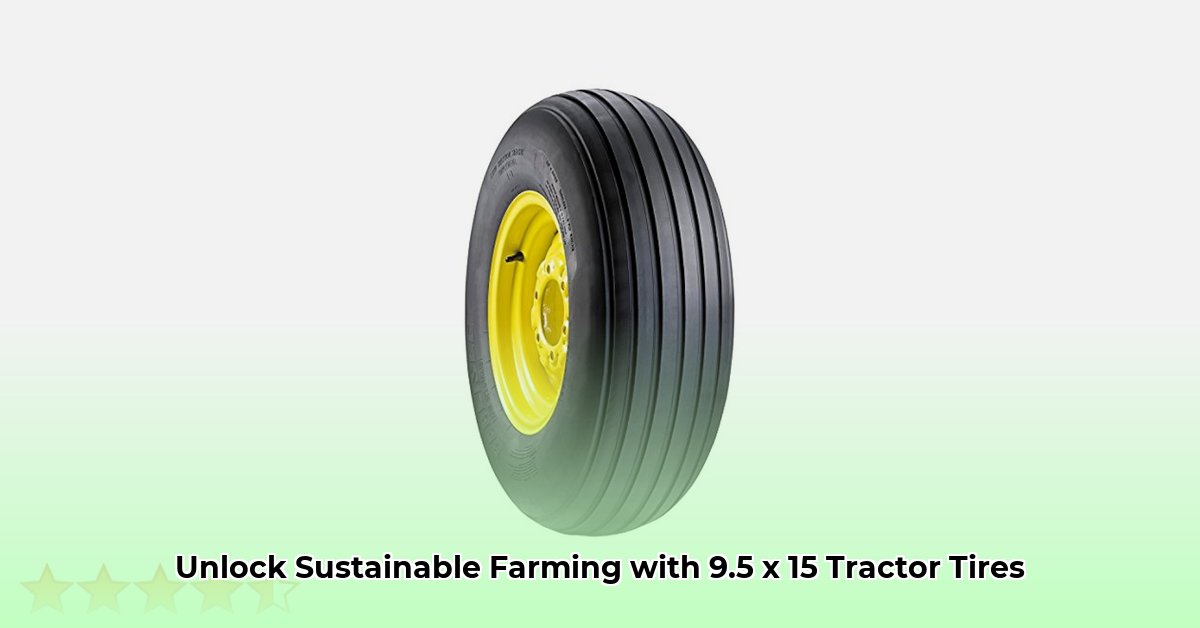
Choosing the right tractor tires is crucial for efficient and sustainable farming. The wrong tires can lead to increased fuel consumption, soil compaction, and reduced productivity. This guide focuses on 9.5 x 15 tractor tires, comparing two popular options: the Carlisle Farm Specialist and the Carlisle Multi Rib. We'll analyze their features, performance, and sustainability aspects to help you make an informed decision. Don't underestimate the impact of your tire choice – it affects your bottom line and the health of your land. For more tire size information, see this helpful chart.
Comparing Carlisle 9.5 x 15 Tractor Tires: Farm Specialist vs. Multi Rib
Both the Carlisle Farm Specialist and Multi Rib tires are designed for demanding agricultural applications. However, their performance characteristics might vary significantly depending on your specific needs and farming conditions. Unfortunately, readily available comparative data is limited, hindering a definitive performance comparison. This analysis will highlight what information is available, along with areas requiring further investigation.
Technical Specifications and Performance
The following table summarizes the key features of each tire, based on available information. Note that some specifications are unavailable at this time, underscoring the need for more comprehensive data from the manufacturer.
| Feature | Carlisle Farm Specialist | Carlisle Multi Rib | Important Considerations |
|---|---|---|---|
| Construction | Details unavailable. | Bias-ply construction | Bias-ply tires are generally less expensive but may not offer the same lifespan or ride quality as radial tires. More research is needed to fully assess this tradeoff. |
| Tread Depth | Precise details unavailable. | Varies by model (check product specifications) | Deeper tread generally means better traction and a longer lifespan, but can slightly affect fuel efficiency. Check the manufacturer's specifications for specific tread depths. |
| Load Capacity | Comparable to the Multi Rib (high for this size) | Available; check product specifications | Crucial for safe operation and avoiding damage to your tractor and equipment. Ensure the tire's load capacity exceeds your anticipated maximum weight. |
| Speed Rating | Information currently unavailable. | Available; check product specifications | This indicates the maximum safe speed. Exceeding this speed significantly increases the risk of tire failure. |
| Tread Pattern | Details not currently published. | Multi-rib design | Multi-rib designs often provide good traction and stability on diverse surfaces. However, other tread patterns may be advantageous in specific situations. |
Isn't it critical to know the exact specifications before investing in new tires? This highlights the need for manufacturers to provide complete and accessible data.
Performance Expectations: Traction, Fuel Efficiency, and Lifespan
Direct comparison is difficult due to limited data. However, we can make some informed observations. The Multi Rib’s multi-rib design likely offers superior traction on varied terrains. The Farm Specialist's tread pattern, if different, may offer a different performance profile.
Fuel efficiency is paramount. While we lack specific comparative data, remember that proper inflation is essential for optimal fuel economy and minimizing soil compaction. Under-inflation severely impacts both.
Predicting lifespan accurately is challenging without detailed tread-wear information. Factors like soil type, workload, and driving practices significantly influence tire longevity. This calls for further scientific study to improve future tire development and user understanding.
Sustainability: Environmental Impact and Lifecycle Considerations
The environmental effects of tire manufacturing and disposal are increasingly important considerations. Unfortunately, data on manufacturing processes, material composition, and recyclability for both tire models is currently limited. More transparent reporting from manufacturers would directly assist farmers in making informed, sustainable choices.
Choosing the Right Tires: A Step-by-Step Guide
Selecting between the Carlisle Farm Specialist and Multi Rib depends on your specific needs. Consider these factors carefully:
Assess Your Soil Conditions: Deep clay, sandy loam, or something else? Soil type greatly influences traction requirements. Do you need a tire with deep treads to prevent slippage?
Define Your Typical Workload: Heavy hauling or light tillage? Higher workloads require tires with increased load capacity.
Determine Your Budget: Bias-ply tires (like the Multi Rib) tend to be less expensive upfront, but their lifespan might be shorter compared to radial tires.
Prioritize Sustainability: If environmental impact is a priority, choose brands that are transparent about their manufacturing processes and recycling programs.
Consult Your Local Tire Dealer: Seeking expert advice is always recommended. They can help assess your needs and recommend the most suitable tire for your specific application.
By carefully considering these factors, you can choose the 9.5 x 15 tractor tires that optimize your farm's productivity and sustainability. Remember, a small investment in the right tires can lead to significant long-term savings and environmental benefits.